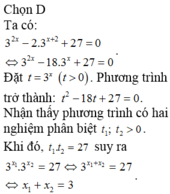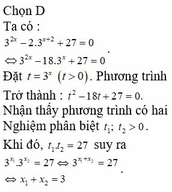Tổng tất cả các nghiệm của phương trình bằng
Hãy nhập câu hỏi của bạn vào đây, nếu là tài khoản VIP, bạn sẽ được ưu tiên trả lời.



ta có \(\Delta=\left(2m-1\right)^2-4\left(m-2\right)\)
\(\Delta=4m^2-8m+9\)
\(\Delta=\left(2m-2\right)^2+5>0\)
do dó phương trình đã cho có 2 nghiệm phân biệt x1 ; x2
áp dụng định lí Vi-ét ta có: \(\hept{\begin{cases}s=x_1+x_2=2m-1\\p=x_1.x_2=m-2\end{cases}}\)
theo bài ra: x13 + x23 = 27
<=> (x1 + x2 )3 - 3x1x2 (x1+x2) - 27=0 <=> (2m-1)3 - 3(m-2) ( 2m-1) -27 =0
<=> 8m3 -12m2 +6m-1 - 6m2 +15m - 6 - 27 =0
<=> 8m3 - 18m2 + 21m - 34 =0 <=> (m-2)(8m2 -2m+17) = 0
\(\Rightarrow\hept{\begin{cases}m-2=0\\8m^2-2m+17=0\left(PTVN\right)\end{cases}}\) <=> m=2
Vậy m=2 thỏa mãn đề bài
( chú giải: PTVN là phương trình vô nghiệm)

\(a,3^{x-1}=27\\ \Leftrightarrow3^{x-1}=3^3\\ \Leftrightarrow x-1=3\\ \Leftrightarrow x=4\\ b,100^{2x^2-3}=0,1^{2x^2-18}\\ \Leftrightarrow10^{4x^2-6}=10^{-2x^2+18}\\ \Leftrightarrow4x^2-6=-2x^2+18\\ \Leftrightarrow6x^2=24\\ \Leftrightarrow x^2=4\\ \Leftrightarrow x=\pm2\)
\(c,\sqrt{3}e^{3x}=1\\ \Leftrightarrow e^{3x}=\dfrac{1}{\sqrt{3}}\\ \Leftrightarrow3x=ln\left(\dfrac{1}{\sqrt{3}}\right)\\ \Leftrightarrow x=\dfrac{1}{3}ln\left(\dfrac{1}{\sqrt{3}}\right)\)
\(d,5^x=3^{2x-1}\\ \Leftrightarrow2x-1=log_35^x\\ \Leftrightarrow2x-1-xlog_35=0\\ \Leftrightarrow x\left(2-log_35\right)=1\\ \Leftrightarrow x=\dfrac{1}{2-log_35}\)


Pt đã cho có 2 nghiệm pb khi:
\(\left\{{}\begin{matrix}m+1\ne0\\\Delta'=\left(m+3\right)^2-\left(m+1\right)\left(2m+9\right)>0\end{matrix}\right.\)
\(\Leftrightarrow\left\{{}\begin{matrix}m\ne-1\\-m^2-5m>0\end{matrix}\right.\)
\(\Leftrightarrow\left\{{}\begin{matrix}m\ne-1\\-5< m< 0\end{matrix}\right.\)
\(\Rightarrow m=\left\{-4;-3;-2\right\}\) có 3 giá trị nguyên

1.
Đặt \(\sqrt{x^2-4x+5}=t\ge1\Rightarrow x^2-4x=t^2-5\)
Pt trở thành:
\(4t=t^2-5+2m-1\)
\(\Leftrightarrow t^2-4t+2m-6=0\) (1)
Pt đã cho có 4 nghiệm pb khi và chỉ khi (1) có 2 nghiệm pb đều lớn hơn 1
\(\Leftrightarrow\left\{{}\begin{matrix}\Delta'=4-\left(2m-6\right)>0\\\left(t_1-1\right)\left(t_2-1\right)>0\\\dfrac{t_1+t_2}{2}>1\\\end{matrix}\right.\)
\(\Leftrightarrow\left\{{}\begin{matrix}10-2m>0\\t_1t_2-\left(t_1+t_1\right)+1>0\\t_1+t_2>2\end{matrix}\right.\)
\(\Leftrightarrow\left\{{}\begin{matrix}m< 5\\2m-6-4+1>0\\4>2\end{matrix}\right.\) \(\Leftrightarrow\dfrac{9}{2}< m< 5\)
2.
Để pt đã cho có 2 nghiệm:
\(\Leftrightarrow\left\{{}\begin{matrix}m\ne3\\\Delta'=1+4\left(m-3\right)\ge0\end{matrix}\right.\)
\(\Leftrightarrow\left\{{}\begin{matrix}m\ne3\\m\ge\dfrac{11}{4}\end{matrix}\right.\)
Khi đó:
\(x_1^2+x_2^2=4\Leftrightarrow\left(x_1+x_2\right)^2-2x_1x_2=4\)
\(\Leftrightarrow\dfrac{4}{\left(m-3\right)^2}+\dfrac{8}{m-3}=4\)
\(\Leftrightarrow\dfrac{1}{\left(m-3\right)^2}+\dfrac{2}{m-3}-1=0\)
\(\Leftrightarrow\left[{}\begin{matrix}\dfrac{1}{m-3}=-1-\sqrt{2}\\\dfrac{1}{m-3}=-1+\sqrt{2}\end{matrix}\right.\)
\(\Leftrightarrow\left[{}\begin{matrix}m=4-\sqrt{2}< \dfrac{11}{4}\left(loại\right)\\m=4+\sqrt{2}\end{matrix}\right.\)

ta có (2x+1)(x-1)2(2x+3)=(4x2+8x+3)(x2+2x+1)=18
đặt x2+2x+1=a ta có (4a-1)a=18
giải hệ trên ta được 2 nghiệm x=0,5 và x=-2,5
đến đay các ban tự giai tiếp nhé

a: \(27^{2-x}< =9\)
=>\(\left(3^3\right)^{2-x}< =3^2\)
=>\(3^{6-3x}< =3^2\)
=>6-3x<=2
=>-3x<=-4
=>\(x>=\dfrac{4}{3}\)
b: \(7^{3-x}< 49\)
=>\(7^{3-x}< 7^2\)
=>3-x<2
=>-x<2-3=-1
=>x>1
c: \(27^{3-x}>9\)
=>\(\left(3^3\right)^{3-x}>3^2\)
=>\(3^{9-3x}>3^2\)
=>9-3x>2
=>-3x>-7
=>\(x< \dfrac{7}{3}\)
d: \(2^{3-x}< 2^3\)
=>3-x<3
=>-x<0
=>x>0
e: \(27^{3-x^2}< 27^{x+1}\)
=>\(3-x^2< x+1\)
=>\(-x^2-x+2< 0\)
=>\(x^2+x-2>0\)
=>(x+2)(x-1)>0
=>\(\left[{}\begin{matrix}x>1\\x< -2\end{matrix}\right.\)

